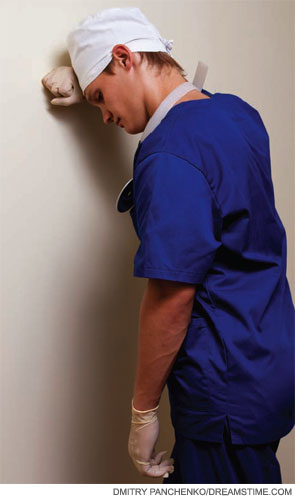
Explore This Issue
July 2011Minneapolis, Minn.—Among the issues highlighted here last month at SLEEP 2011, the 25th Annual Meeting of the Associated Professional Sleep Societies, was the effect of inadequate sleep on both the health of the individual and on society at large. Two studies presented at the meeting, for example, looked at the effects of inadequate sleep on health care providers and the risks posed to their health and the health of their patients. Another study put into context just how underreported inadequate sleep and sleep disorders are and elaborated on the challenge this poses to otolaryngologists and others who are on the frontlines managing these disorders.
Critical Care Nurses
In a study that generated much discussion among conference attendees, Diana E. McMillan, RN, PhD, associate professor of nursing at the University of Manitoba, reported on the results of a Canadian National Survey that looked at how working night shifts affects critical care nurses. A web-based survey containing 62 questions was sent out to members of the Canadian Association of Critical Care Nurses. Questions included nurses’ perceptions of symptoms experienced while working night shifts, their sleep health on work and non-work days, napping practices, nurse and patient safety during the night shift and nurse safety on the drive home after working a night shift.
Dr. McMillan’s research is part of a pilot study, the entirety of which was presented at SLEEP 2011 as a poster titled “Canadian National Survey of Critical Care Nurses: Practices and Perceptions of Napping on Night Shift.”
A total of 536 people responded to the survey (88 percent female; mean age of 42 years), 66 percent or more of whom were critical care nurses with more than six years of experience and worked full time (at least 75 percent) in a tertiary hospital (65 percent). Most worked 12 hour shifts (88 percent).
Symptoms reported included nausea, chills, eye strain, fatigue, irritability, forgetfulness and stress. According to Dr. McMillan, 32 percent of respondents reported always feeling tired on night shifts. Researchers discovered that of these respondents, 43 percent had fallen asleep at a traffic light driving home from work and 31 percent while the car was moving; 26 percent reported fatigue-related personal work injury or near injury. Patients were also affected, with 16.4 percent of nurses reporting fatigue-related incidents and errors affecting patients.
Leave a Reply